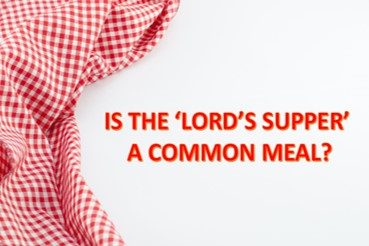
Introduction
Have you ever wondered why the Lord’s Supper is held in the morning and not in the evening as a meal? Have you ever wondered why the Lord’s Supper doesn’t even come close to being a meal because we simply take a sip of the fruit of the vine and a small piece of bread?
First of all, we have to remember that the Lord didn’t ask us to remember Him by having an ordinary meal. The Lord’s supper was turned into a common meal by some and Paul severely rebuked them for this, 1 Corinthians 11:20-22.
Paul is telling them they had houses in which to eat their ordinary meals, and reminded them that the Lord asked us to remember Him in drinking from the cup of grape juice and eating from the unleavened loaf, 1 Corinthians 11:23-29 / 1 Corinthians 10:16-17 / Matthew 26:26-29 / Mark 14:22-25.
Doing that is what he termed ‘the Lord’s Supper’, 1 Corinthians 11:20 ‘So then, when you come together, it is not the Lord’s Supper you eat.’
The Lord’s supper is the primary reason why the whole church should come together in one place on ‘the first day of the week’ and not in order to eat an ordinary meal. I agree that a sip of grape juice and a tiny piece of bread isn’t exactly eating. It should be enough to drink and to chew but just enough since the cup and the loaf had to serve the whole gathering.
The early church observed the ‘Lord’s Supper’, ‘Kuriakos deipnon’, on ‘the first day of the week’, Acts 20:7 ‘On the first day of the week we came together to break bread.’
This is known as ‘the Lord’s Day’, ‘te Kuriakos hemera’, Revelation 1:10 ‘I was in the Spirit on the Lord’s Day when I heard behind me a loud voice like a trumpet.’
These are the only two places where the word, ‘Lord’s’, ‘Kuriakos’ is used in the Bible. The phrase ‘the first day of the week,’ was a Hebrew idiom for the day after the Sabbath. It lasted from Saturday evening to Sunday evening.
When Paul visited the church in Troas they came together on a Saturday evening in order to ‘break bread’, ‘klao artos’.
Paul’s message ended abruptly when a young man fell through a window, Acts 20:10 ‘But Paul went down, threw himself on the young man, put his arms around him, and said, “Do not be distressed, for he is still alive!’
They satisfied themselves that the boy was all right. Then Paul ate his meal, Acts 20:11. If the ‘Lord’s Supper’ was a fully-fledged, physically satisfying, common meal, why did Paul eat again?
In English, the word ‘supper’ means the evening meal but in the New Testament the word translated ‘supper’, ‘deipnon’ can have two meanings.
1. The main meal of the day, John 12:2.
2. A feast celebrating a special occasion, Luke 14:16-17 / Luke 14:24 / Luke 20:46 / Revelation 19:9 / Revelation 19:17.
Although the main meal of the day was usually taken in the evening, feasts would often last most of the day. So, the significance of ‘the Lord’s Supper’ isn’t the time of day but the importance of the occasion.
